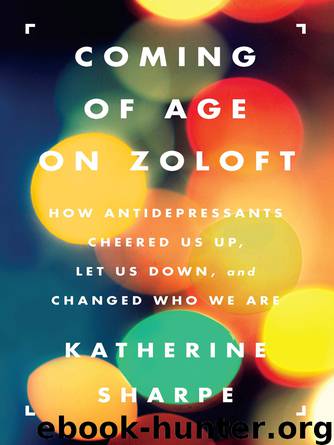Coming of Age on Zoloft by Katherine Sharpe

Author:Katherine Sharpe
Language: eng
Format: epub
Publisher: HarperCollins US
Published: 2012-02-03T16:00:00+00:00
DURING MY SECOND year in Ithaca, blundering around in the dimly lit stacks of Cornell’s graduate library, I stumbled across a book that would give me a more refined way of thinking about the magic that was happening in John’s office. Karen Horney was a German psychoanalyst who emigrated to the United States in the 1930s. I hadn’t heard of her, and I’d been looking for something else when I found her book Neurosis and Human Growth wedged into a bottom shelf next to some of the heavyweights of twentieth-century psychology, but its strange old title called out to me, and on a whim I took it home.
Horney’s premise was that, in childhood, most people suffer from the feeling of being small and powerless in a dangerous world; she considered the feeling so common that she called it “basic anxiety.” She believed that children attempt to soothe their fears and insecurities by resorting to their imaginations, beginning to picture a version of themselves that embodies all the traits that the child, or the people around her, find most admirable. By adolescence, these imaginings begin to solidify into the image that Horney calls the “ideal self.” Our ideal selves are the smartest, the kindest, the shrewdest, the most lovable—depending on how we want to see ourselves. But what starts out as a protective fantasy quickly becomes an instrument of self-torture too, giving rise to the tricky system of inner conflicts and secondary insecurities that Horney called neurosis. Specifically, she wrote, neurotics suffer from the strain of their own doomed quest to become the superhuman image they have created. They flagellate themselves with a barrage of statements that include the word should. The “shoulds” are the demands that must be satisfied in order to transform the neurotic person into his idealized self—and his failure to live up to them leads to the slow, seeping growth of self-hate.
Reading Neurosis and Human Growth was an astonishing experience. Horney wrote about things I didn’t know anyone else had noticed, let alone been able to explain. At moments, getting through it felt difficult and almost embarrassing; Horney hadn’t even had to meet me to see me at my worst. She had grasped the feelings of superiority I tried to hide, even from myself, and also the appalling lack of confidence that was right beside it. She understood what I’d never been able to, which was how the two could coexist, how they were actually functions of one another. But it was the understanding, of course, that made the reading bearable. It was worth being flayed a little to get a wise take on old mysteries.
But it wasn’t all flaying, either. Horney’s ideas didn’t just make intuitive sense to me; the way she talked about neurosis felt good, even hopeful, in a way that the chemical-imbalance theories never had. She thought, for one thing, that almost all people were neurotic to some degree, and that our society tended to make us so. While she didn’t think that neurosis was healthy, she believed that struggling with it was a basic theme in human life.
Download
This site does not store any files on its server. We only index and link to content provided by other sites. Please contact the content providers to delete copyright contents if any and email us, we'll remove relevant links or contents immediately.
Should I Stay or Should I Go? by Ramani Durvasula(7652)
Why We Sleep: Unlocking the Power of Sleep and Dreams by Matthew Walker(6700)
Fear by Osho(4727)
Flow by Mihaly Csikszentmihalyi(4687)
Rising Strong by Brene Brown(4448)
Why We Sleep by Matthew Walker(4434)
The Hacking of the American Mind by Robert H. Lustig(4375)
How to Change Your Mind by Michael Pollan(4355)
Too Much and Not the Mood by Durga Chew-Bose(4337)
Lost Connections by Johann Hari(4171)
He's Just Not That Into You by Greg Behrendt & Liz Tuccillo(3891)
Evolve Your Brain by Joe Dispenza(3671)
The Courage to Be Disliked by Ichiro Kishimi & Fumitake Koga(3488)
Crazy Is My Superpower by A.J. Mendez Brooks(3398)
In Cold Blood by Truman Capote(3374)
Resisting Happiness by Matthew Kelly(3337)
What If This Were Enough? by Heather Havrilesky(3308)
The Book of Human Emotions by Tiffany Watt Smith(3300)
Descartes' Error by Antonio Damasio(3270)
